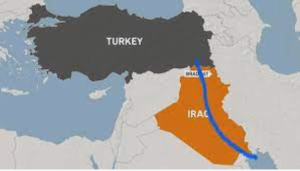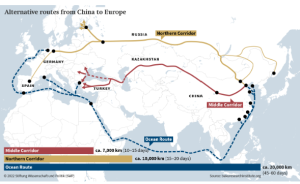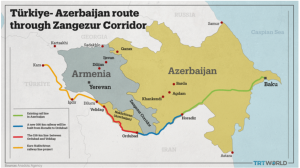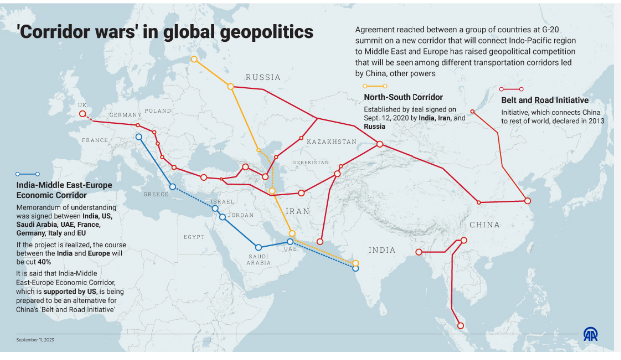Great Power Wars, friend shoring and the wars in Ukraine and Middle East has started a scramble to reorganize supply chains, which requires new transit corridors. The West’s answer to China’s Belt and Road initiative is IMEC, a lengthy corridor that runs from India through Saudi Arabia, Israel and Greece to Europe. Mostly because of Turkey’s poor relations with India (Turkey is a stalwart ally of Pakistan) and Biden White House, she was excluded from IMEC.
Yet, Turkey has her own goose to cook—and serve to companies all along the world. This article largely covers the Iraq Development Road, but Armenia falling victim to Azerbaijan increase the potential for China’s Middle Corridor to become more active through the Azerbaijan-Turkey axis.
“We see others coming out and naming new corridors, so we need to move fast. One of the reasons for the Ottoman Empire’s downfall was the Silk Road route being forsaken after the opening of the Suez Canal,” which weakened its economy, Alper Ozel, executive committee chairman at the International Transporters’ Association said. He called for a further strengthening of connectivity along what Turkey calls the Middle Corridor — a route aligned with China’s Belt and Road Initiative, passing through Turkic states between Europe in the West and China in the East.
Turkey, seen as a natural bridge between Asia and Europe, is perhaps one of the most sensitive countries to changes in trade routes, as Ottomans bitterly experienced during the Age of Discovery. Ozel’s alarm, and developments since, highlight Turkish discomfort with new plans like the India-Middle East-Europe Economic Corridor (IMEC) announced on the sidelines of the Group of 20 last month, and Ankara’s determination to strengthen routes that place Turkey in an integral position.
The proposed IMEC would run from India to the United Arab Emirates, Saudi Arabia, Jordan and Israel to reach Europe — bypassing Turkey.
In an interview with Nikkei on Oct. 15, Turkey’s Transportation and Infrastructure Minister Abdulkadir Uraloglu said that Turkish, Iraqi, Emirati and Qatari officials gathered this month to work on a project known as the Iraq Development Road. The minister referred to this as a “serious alternative” to IMEC.
The Iraqi project, also known as the “dry canal,” would transport goods from the Grand Faw port in southern Iraq. The port’s first phase is being developed by South Korea’s Daewoo Engineering & Construction. The route would extend to the northern border with Turkey, following 1,200 km of railways and roads.
On Turkey’s side, 615 km of new railway and 320 km of new highways will also be built to connect it to the Turkish network, with a combined cost of around $25 billion in both countries, according to the minister.
He added that ministers from the four nations are expected to meet around the end of this month to discuss it further.
“The project planning phase is almost complete. We are now in discussions as four countries on how to build it and how to operate it,” Uraloglu said. He added that the UAE and Qatar will provide strong backing and that additional means of financing — including European banks, payment by oil and Turkey’s own investments — are under consideration.

“When we look at freight transportation and commerce, there has been intense movement toward the East-West direction, which has always been the case. But now we see serious movement has started on the South-North axis as well. One should see our effort as participating in the South-North axis movements — an effort not to stay outside of this transportation,” Uraloglu said, explaining the rationale.
“The Development Road project will undoubtedly be the best, shortest and most affordably priced route within the South-North corridors that will connect … East Asia, the Middle East and Europe,” Uraloglu said.
Once construction starts, it will take a minimum of five years to complete, he said.
Asked about security considerations in Iraq, Uraloglu said the country is “much safer than it was a decade ago, and in five years’ time, there will be no security problems left because the passing of this corridor is advantageous for everyone.”
On the other hand, he argued that security will be an issue for IMEC, given the erupting war between Israel and the Palestinian group Hamas and fears that it could spiral into a regional conflict.

“We can see that there is a security problem,” he said. “Of course in such megaprojects, it will be also taken into consideration.” He also pointed to reports that Saudi Arabia may have decided to pause discussion of normalization with Israel in light of the war. If confirmed, this would complicate implementation of IMEC.
Despite the minister’s dim view of IMEC, some analysts are not dismissing the plan — and even see potential for Turkish participation.
Michael Tanchum, who published a research paper on “India’s Arab-Mediterranean Corridor” as early as 2021 through the National University of Singapore, told Nikkei Asia, “There is plenty of room for other countries to join IMEC, and the top two candidates are Turkey and Egypt.”
Tanchum said IMEC and the Middle Corridor are “complementary.” He also emphasized that Turkey has built all-weather business relationships with Israel and the UAE, and recommended that Ankara, a staunch backer of Pakistan, should strive for the same with India. Israel this week recalled diplomats from Turkey as a “temporary measure” over security concerns amid the spiraling war.
Uraloglu said that until 2053, another $162 billion will be invested in such fields, with a greater focus on developing railway infrastructure, doubling the total length to 28,000 km and contributing to the country’s net-zero emissions target by that year.
Uraloglu said Turkey is willing to enhance cooperation with China and is in talks with the Chinese on financing of several new railway lines, while also inviting Japanese financing. Turkey signed a memorandum of understanding with China in 2015 to align the Middle Corridor initiative with the BRI.
Turkey and Azerbaijan are also aiming to open a new route via Armenia, which they call the “Zangezur Corridor,” boosting total freight capacity.

“We want Armenia to join us as we will connect with a wide geography. … They should set aside political approaches and think rationally,” Uraloglu said, alluding to longstanding tensions and historical grievances. Armenia and Azerbaijan are in talks to sign a treaty on peace and delimitation of borders after their recent war ended with an Azerbaijan victory. Turkey and Armenia have had a separate track for their own normalization talks since last year.
“If it is not passing Armenia, it will pass Iran and they will be utilizing all the benefits instead.”
Uraloglu stressed that multiple routes are needed to handle increasing trade volumes. “Now the northern corridor [via Russia] is problematic due to the war [in Ukraine]. On the southern sea route, we saw how global trade was disrupted when an accident happened at the Suez Canal. We need all and need to sustain all.”
Follow our English language YouTube videos @ REAL TURKEY: https://www.youtube.com/channel/UCKpFJB4GFiNkhmpVZQ_d9Rg
And content at Twitter: @AtillaEng
Facebook: Real Turkey Channel: https://www.facebook.com/realturkeychannel/
New Economic Corridors in the South Caucasus and the Chinese One Belt One Road
